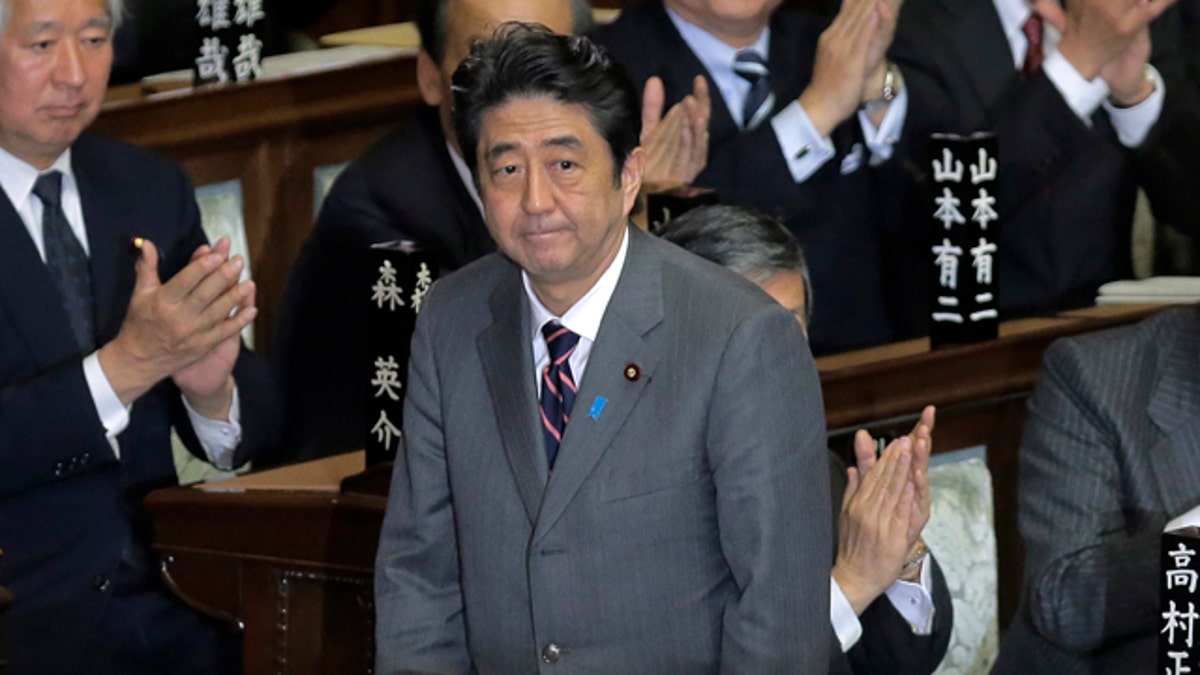
Dec. 26, 2012: Japan's Liberal Democratic Party leader Shinzo Abe acknowledges applause from lawmakers after being named Japan's new prime minister at the lower house of Parliament in Tokyo. (AP)
TOKYO – Japan's parliament elected Shinzo Abe as the nation's prime minister on Wednesday, ending three years of rule by liberal administrations and bringing back to power the conservative, pro-big business party that has run Japan for most of the post-World War II era.
Abe, whose nationalist positions have in the past angered Japan's neighbors, is the country's seventh prime minister in just over six years. He has promised to restore growth to an economy that has been struggling for 20 years.
He led the Liberal Democratic Party to victory in nationwide elections Dec. 16 to cement his second term as Japan's leader. He was also prime minister in 2006-2007 before resigning for health reasons that he says are no longer an issue.
He won elections in both houses of Parliament, though in the less powerful upper house, where his party is weaker, he finished second in the first round and needed a runoff to win. He was to name his Cabinet later Wednesday.
Capitalizing on voter discontent with the left-leaning Democratic Party of Japan, Abe has vowed to shore up the economy, deal with a swelling national debt and come up with a recovery plan following last year's devastating earthquake, tsunami and nuclear crises.
Abe has also stressed his desire to make Japan a bigger player on the world stage, a stance that has resonated with many voters who are concerned that their nation is taking a back seat economically and diplomatically to China. Abe has vowed to stand up to Beijing over an ongoing territorial dispute and strengthen Tokyo's security alliance with Washington.
"I feel as fresh as the clear sky today," he told reporters before the vote, adding that he wanted to get right to work.
He has already named a roster of top party executives that includes two women -- more than previous LDP administrations -- and is younger than earlier ones, with three of the four in their 50s.
Abe was expected to give the finance portfolio to another former prime minister, Taro Aso. The new foreign minister likely will be Fumio Kishida, an expert on the southern island of Okinawa, where residents are calling for the removal of nearly 20,000 US troops based there. The defense minister was expected to be Itsunori Onodera, who was in Abe's previous administration.
The LDP governed Japan for decades after it was founded in 1955. Before it was ousted in 2009, the LDP was hobbled by scandals and problems getting key legislation through a divided parliament.
This time around, Abe has promised to make the economy his top priority and is expected to push for a 2 percent inflation target designed to fight a problem that was until recently relatively unique in the world -- deflation. Continually dropping prices deaden economic activity, and the Japanese economy has been stuck in deflation for two decades.
Besides generous promises to boost public works spending -- by as much as 10 trillion yen ($119 billion), according to party officials -- Abe is pressuring the central bank to work more closely with the government to reach the inflation target.
He has acknowledged, however, that the road ahead for Japan will be bumpy.
"Our party leadership will undoubtedly have to deal with many issues," he said Tuesday.
